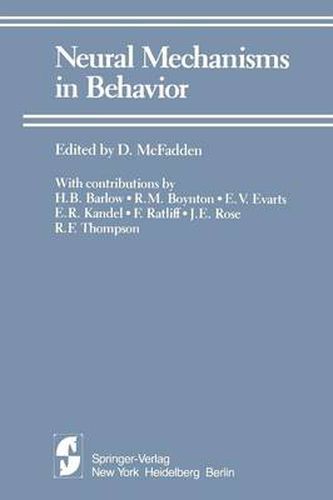Readings Newsletter
Become a Readings Member to make your shopping experience even easier.
Sign in or sign up for free!
You’re not far away from qualifying for FREE standard shipping within Australia
You’ve qualified for FREE standard shipping within Australia
The cart is loading…






This title is printed to order. This book may have been self-published. If so, we cannot guarantee the quality of the content. In the main most books will have gone through the editing process however some may not. We therefore suggest that you be aware of this before ordering this book. If in doubt check either the author or publisher’s details as we are unable to accept any returns unless they are faulty. Please contact us if you have any questions.
This book is the product of a two-day symposium held at the University of Texas, Austin, in March 1978. There was double motivation for our hosting a symposium on neural mechanisms in behavior. The 1977-1978 academic year marked both the 50th anniversary of the Department of Psychology at Texas and the 30th anniversary of the famous Hixon Symposium organized by the longest serving member of the department, LLOYD JEFFRESS. PHILIP GOUGH, then chairman of the department, suggested that the department celebrate these two historic events, and honor itself in the process, by holding the first of a series of symposia on topics in experimental psychology. Approval and initial funding for this enterprise came from ROBERT KING, then Dean of Social and Behavioral Sciences; additional funds were pro vided by the Program in Cognitive Science of the Sloan Foundation. Proceeds from the sale of this volume will all pass into a fund to help support subsequent symposia and volumes. At 50 we are clearly a young department, even for a psy chology department, but psychology was at least nominally present from the beginning of The University of Texas in 1883. Then, courses in psychology were offered in the School of Philosophy and had wonderful titles, such as Mental Science (Strictly Speaking).
In 1898, the first experimental psychology course was offered. (Or at least it was intended to be offered; the catalog indicated that it was contingent upon the availability of necessary equipment.
$9.00 standard shipping within Australia
FREE standard shipping within Australia for orders over $100.00
Express & International shipping calculated at checkout
Stock availability can be subject to change without notice. We recommend calling the shop or contacting our online team to check availability of low stock items. Please see our Shopping Online page for more details.
This title is printed to order. This book may have been self-published. If so, we cannot guarantee the quality of the content. In the main most books will have gone through the editing process however some may not. We therefore suggest that you be aware of this before ordering this book. If in doubt check either the author or publisher’s details as we are unable to accept any returns unless they are faulty. Please contact us if you have any questions.
This book is the product of a two-day symposium held at the University of Texas, Austin, in March 1978. There was double motivation for our hosting a symposium on neural mechanisms in behavior. The 1977-1978 academic year marked both the 50th anniversary of the Department of Psychology at Texas and the 30th anniversary of the famous Hixon Symposium organized by the longest serving member of the department, LLOYD JEFFRESS. PHILIP GOUGH, then chairman of the department, suggested that the department celebrate these two historic events, and honor itself in the process, by holding the first of a series of symposia on topics in experimental psychology. Approval and initial funding for this enterprise came from ROBERT KING, then Dean of Social and Behavioral Sciences; additional funds were pro vided by the Program in Cognitive Science of the Sloan Foundation. Proceeds from the sale of this volume will all pass into a fund to help support subsequent symposia and volumes. At 50 we are clearly a young department, even for a psy chology department, but psychology was at least nominally present from the beginning of The University of Texas in 1883. Then, courses in psychology were offered in the School of Philosophy and had wonderful titles, such as Mental Science (Strictly Speaking).
In 1898, the first experimental psychology course was offered. (Or at least it was intended to be offered; the catalog indicated that it was contingent upon the availability of necessary equipment.